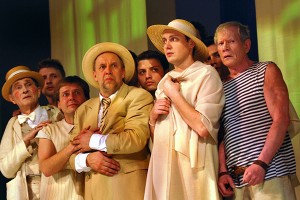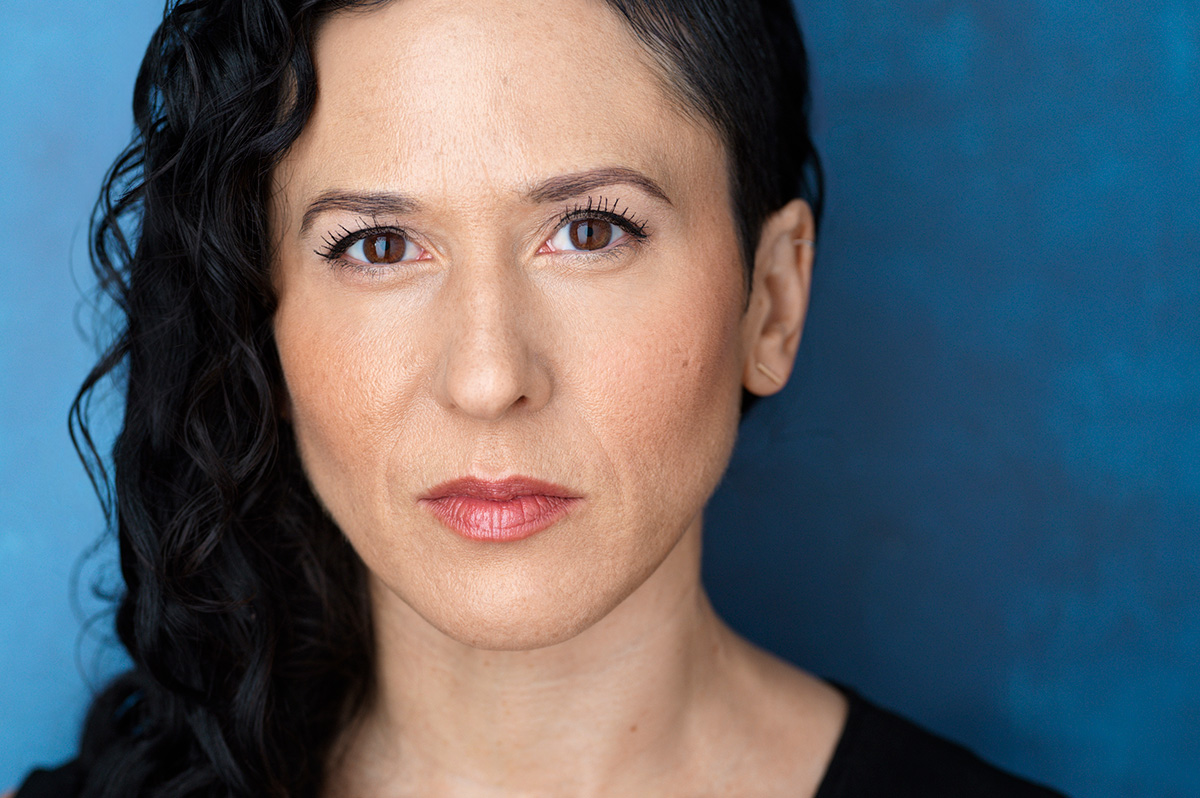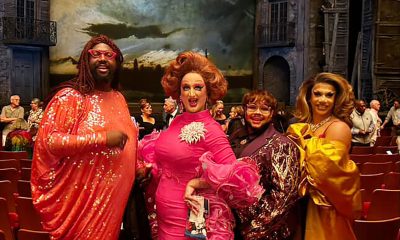Theater
YEAR IN REVIEW: Theatrical partnerships and productions
Several collaborative efforts among the year’s theatrical bright spots

This all-male production of ‘Twelfth Night’ from Chekhov International Theatre Festival in October was a highlight of this year's regional theatrical offerings. (Photo by Victor Sintsov; courtesy of the Festival)
Despite a still-struggling economy, it’s been a pretty good year for theater in the D.C. area. Along with the crowd-pleasing big musicals, there has been a wide variety of riskier and more offbeat productions. Interestingly, the year that brought marriage equality to the nation’s capital also saw an unusually high number of LGBT couples (some married, others not) enjoying productive theatrical collaborations.
Ganymede Arts, D.C.’s only company dedicated to the LGBT experience, grabbed theatergoers’ attention with two terrific musical productions in 2010: “Naked Boys Singing” in the spring, and more recently “Falsettos,” Lapine and Williams’ gay-themed musical about love and family in the time of AIDS.
Surely one of the harder working folks in local theater, Ganymede’s gay artistic director Jeffrey Johnson staged both shows and played the lead, Marvin, in “Falsettos.” He performed two one-woman shows — his pink-haired drag persona Galactica act and “After the Garden — Edie Beale LIVE at Reno Sweeney” — locally and on tour. True to industrious form, Johnson is closing the year with a new non-lip syncing Galactica cabaret show tonight at Noi’s Nook on 14th Street, N.W.
Holly Twyford tested her range in 2010, playing a tap dancing pig in Adventure Theatre’s summer production “If You Give a Pig a Pancake.” Twyford, an award-winning local actor who is gay returned to children’s theater after a long absence in order to give her young daughter a chance to see what mommy does for a living. More recently, Twyford played Pamela, a boozy, country club cougar in Signature’s premiere of Ken Ludwig’s comedy “A Fox on the Fairway,” a show to which her little girl was most probably not invited.
In September, Factory 449 continued building its reputation for impressive and challenging work with Erik Ehn’s “The Saint Plays,” an exploration of traditional saints in contemporary settings. Directed and produced respectively by John Moletress and Rick Hammerly, both of whom are gay, the ensemble production was beautifully acted and imaginatively staged.
At Studio Theatre (a favorite with Blade readers), gay director Serge Seiden drew excellent performances from small casts in two plays featuring complex, intergenerational relationships: “Sixty Miles to Silver Lake,” and Tracey Letts’ comedy “Superior Donuts.”
Many good things came from out of town this year including the New York-based, gay actor Nicholas Rodriguez. Currently playing cowboy Curly in Arena Stage’s hit production “Oklahoma!,” the handsome young Broadway actor became widely known for playing earnest-but-sexy activist Nick Chavez, the third man in a tumultuous gay love triangle on TV’s “One Life to Live.” Rodriguez initially came to Washington in the spring to play Latin lover Fabrizio in Adam Guettel’s gorgeous musical “The Light in the Piazza” (also at Arena).
Veteran gay actor John Glover is usually found in New York or L.A., but in March he came to town and put his stamp on the part of over-the-top opera queen Mendy (a role originally created by gay actor Nathan Lane) in Terrence McNally’s “The Lisbon Traviatia.” The production was part of the Kennedy Center’s mini-festival “Terrence McNally’s Nights at the Opera.”
Gay director José Luis Arellano García made the trip from Spain to Columbia Heights to stage an earthy and athletic production of Lope de Vega’s “El caballero de Olmedo” (“The Knight from Olmedo”) at Gala Hispanic Theatre. García’s partner, David R. Peralto, provided a varying pulse to the circa 1620 tragedy with his own period-sounding compositions and selected folk music.
For a short time in October, D.C. audiences were delighted with the brilliant work of British director Declan Donnellan and his longtime partner (professional and personal) set designer Nick Ormerod. As part of the Chekhov International Theatre Festival, the couple brought stellar productions (performed in Russian by fabulous Russian actors) of Chekhov’s “Three Sisters” and an all-male production of Shakespeare’s “Twelfth Night” to the Kennedy Center.
Local theater couple Christopher Henley (Washington Shakespeare Company’s artistic director) and Jay Hardee successfully continued their collaboration on and off stage in 2010. In addition to marrying in the fall, the talented pair recently co-staged a strikingly inventive production of “Richard III” in the company’s spanking new black box space in Arlington’s Artisphere. Earlier this year, Hardee directed Henley as “He,” the embodiment of state-inflicted evil in the world English language premiere of Chilean playwright Marco Antonio de la Parra’s “Every Young Woman’s Desire,” an intense allegory of Pinochet’s brutal dictatorship.
On April 8 at the Warner Theatre in what was definitely one of the highlights of the theater year, famed gay playwright Terrence McNally, 70, warmly presented the Helen Hayes Tribute to his “friend, colleague and ex,” the even more famous gay playwright Edward Albee (the pair were lovers in the 1960s). McNally lauded Albee’s genius as evidenced by a long list of extraordinary works, including “Who’s Afraid of Virginia Woolf?,” “The Zoo Story,” “A Delicate Balance” and more (Albee has multiple Tonys and Pulitzers). At a small party the night before the awards, Albee, 82, shared with the Blade his appreciation of the energetic D.C. theater scene and its intelligent audiences.
Theater
‘Andy Warhol in Iran’ a charming look at intersection of art, politics
Mosaic production plumbs kidnapping plot of iconic artist for humor

‘Andy Warhol in Iran’
Through July 6
Mosaic Theater Company at Atlas Performing Arts Center
1333 H St., N.E., WDC
$70
Mosaictheater.org
Behind the blasé veneer, Andy Warhol was more curious than people knew. Particularly when it came to money. He kept a close eye on how the ultra-rich lived, what fellow artists were being paid and who was paying them, and, of course, all the new and more saleable ways of making and selling art.
In playwright Brent Askari’s “Andy Warhol in Iran,” now playing at Mosaic Theater Company, Warhol (Alex Mills) is brought outside of his usual area of interest when he lands face to face with a young revolutionary. While Warhol could be artistically revolutionary, he didn’t connect with the idea of forgoing the pursuit of money and fame for the infinitely more difficult task of achieving social justice.
The 90-minute play is not fully factual, but rather inspired by Warhol’s real life 1976 trip to Tehran to make portraits of the royal Pahlavi family in the waning days of their reign, with a focus on Farah Diba, the Shah’s elegant wife and Iran’s last empress.
The action unfolds in a Tehran hotel suite boasting a glorious view of the snowcapped Alborz Mountains not far from Iran’s vibrant and bustling capital. It’s here, disguised as room service, that Farhad (played by Nathan Mohebbi) gains entrance to Warhol’s rooms, seeking to kidnap the pop art star to garner attention for the university students’ movement.
Warhol meets the armed intruder with a sort of wide-eyed wonderment, flummoxed why he has been selected for abduction. Warhol can’t understand why a young man like Farhad wouldn’t prefer to be paid a big ransom on the spot, or be cast as a star in one of the Warhol Factory flicks.
When Farhad replies it’s because Warhol is the most decadent artist in the world, Warhol mistakenly takes it for the ultimate compliment. After all, his biggest successes had been connected to celebrity and consumerism (think Campbell’s Soup Cans. 1962).
For Warhol, decadence is aspirational. He made portraits of financiers, movie stars, and jet setters. In fact, he’d been obsessed with the lives of the rich and famous since he was a small kid in Pittsburgh thumbing through Photoplay Magazine while bed bound with Saint Vitus Dance.
Accompanying Warhol to Tehran (unseen) are his business manager Fred Hughes, and Bob Colacello, editor of Interview magazine. Together, they make a merry trio of gay social climbers. These kinds of trips were a boon to the artist. Not only did they solidify a new strata of high society contacts, but were also superbly lucrative, thickly padding the painter’s pockets.
While in Iran, Warhol wanted only to view Farah’s vast world-class collection of jewels, sample the caviar on tap, and get his Polaroids. Then he’d fly first class back to New York and transfer the images to silk screen and sell the portraits to the Persian royals at a hefty price. He didn’t foresee any obstacles along the way.
Serge Seiden’s direction is spot on. He’s rendered a wonderfully even two-hander with a pair of terrifically cast actors. And Seiden plumbs the piece for humor mostly drawn from the absurdity of the situation without missing any of the serious bits.
As Warhol, out actor Mills is instantly recognizable as the eccentric artist. He’s wearing the button-down shirt, jeans, blazer, glasses, and, of course the famed shock of white hair wig (here a little more Karen than Andy). His portrayal is better than an imitation. He gives a bit of the fey and confused, but has also infuses him with a certain dynamism.
The energy works well with the intensity of Mohebbi’s would-be kidnapper Farhad. And while it isn’t a romance, it’s not impossible to think that Warhol might fall for a handsome male captor.
The connection between art and politics is almost always interesting; and though not a super deep dive into the era or the life of an artist, “Andy Warhol in Iran” is a compelling, charming, and sometimes funny glimpse into that intersection.
Theater
‘Hunter S. Thompson’ an unlikely but rewarding choice for musical theater
‘Speaks volumes about how sad things land on our country’

‘The Untitled Unauthorized Hunter S. Thompson Musical’
Through July 13
Signature Theatre
4200 Campbell Ave., Arlington, Va.
$47 to $98
Sigtheatre.org
The raucous world of the counterculture journalist may not seem the obvious choice for musical theater, but the positive buzz surrounding Signature Theatre’s production of Joe Iconis’s “The Untitled Unauthorized Hunter S. Thompson Musical” suggests otherwise.
As the titular, drug addled and gun-toting writer, Eric William Morris memorably moves toward his character’s suicide in 2005 at 67. He’s accompanied by an ensemble cast playing multiple roles including out actor George Salazar as Thompson’s sidekick Oscar “Zeta” Acosta, a bigger than life Mexican American attorney, author, and activist in the Chicano Movement who follows closely behind.
Salazar performs a show-stopping number — “The Song of the Brown Buffalo,” a rowdy and unforgettable musical dive into a man’s psyche.
“Playing the part of Oscar, I’m living my Dom daddy activist dreams. For years, I was cast as the best friend with a heart of gold. Quite differently, here, I’m tasked with embodying all the toxic masculinity of the late ‘60s, and a rampant homophobia, almost folded into the culture.”
He continues, “My sexuality aside, I like to think that Oscar would be thrilled by my interpretation of him in that song.
“Our upbringings are similar. I’m mixed race – Filipino and Ecuadorian and we grew up similarly,” says Salazar, 39. “He didn’t fit in as white or Mexican American, and fell somewhere in the middle. Playing Oscar [who also at 39 in 1974 forever disappeared in Mexico], I pulled out a lot of experience about having to code switch before finally finding myself and being confident just doing my own thing.
“As we meet Oscar in the show we find exactly where’s he’s at. Take me or leave me, I couldn’t care less.”
In 2011, just three years after earning his BFA in musical theater from the University of Florida in Gainesville, Salazar fortuitously met Iconis at a bar in New York. The pair became fast friends and collaborators: “This is our third production,” says George. “So, when Joe comes to me with an idea, there hasn’t been a moment that I don’t trust him.”
In “Be More Chill,” one of Iconis’s earlier works, Salazar originated the role of Michael Mell, a part that he counts as one of the greatest joys of artistic life.
With the character, a loyal and caring friend who isn’t explicitly queer but appeals to queer audiences, Salazar developed a fervent following. And for an actor who didn’t come out to his father until he was 30, being in a place to support the community, especially younger queer people, has proved incredibly special.
“When you hear Hunter and Oscar, you might think ‘dude musical,’ but I encourage all people to come see it.” Salazar continues, “Queer audiences should give the show a shot. As a musical, it’s entertaining, funny, serious, affecting, and beautiful. As a gay man stepping into this show, it’s so hetero and I wasn’t sure what to do. So, I took it upon myself that any of the multiple characters I play outside of Oscar, were going to be queer.
Queer friends have seen it and love it, says Salazar. His friend, Tony Award-winning director Sam Pinkleton (“Oh, Mary!”) saw Hunter S. Thompson at the La Jolla Playhouse during its run in California, and said it was the best musical he’d seen in a very long time.
“Since the work’s inception almost 10 years ago, I was the first Oscar to read the script. In the interim, the characters’ relationships have grown but otherwise there have been no major changes. Still, it feels more impactful in different ways: It’s exciting to come here to do the show especially since Hunter S. Thompson was very political.”
Salazar, who lives in Los Angeles with his partner, a criminal justice reporter for The Guardian, is enjoying his time here in D.C. “In a time when there are so many bans – books, drag queens, and travel — all I see is division. This is an escape from that.”
He describes the Hunter Thompson musical as Iconis’s masterpiece, adding that it’s the performance that he’s most proud of to date and that feels there a lot of maturity in the work.
“In the play, Thompson talks to Nixon about being a crook and a liar,” says Salazar. “The work speaks volumes about how sad things land on our country: We seem to take them one step forward and two steps back; the performance is almost art as protest.”
Theater
A hilarious ‘Twelfth Night’ at Folger full of ‘elegant kink’
Nonbinary actor Alyssa Keegan stars as Duke Orsino

‘Twelfth Night’
Through June 22
Folger Theatre
201 East Capitol St., S.E.
$20-$84
Folger.edu
Nonbinary actor Alyssa Keegan (they/them)loves tapping into the multitudes within.
Currently Keegan plays the melancholic Duke Orsino in Folger Theatre’s production of Shakespeare’s romantic comedy “Twelfth Night.” Director Mei Ann Teo describes the production as “sexy, hilarious, and devastating” and full of “elegant kink.”
Washington-based, Keegan enjoys a busy and celebrated career. Her vast biography includes Come From Away at Ford’s Theatre; Cat on a Hot Tin Roof (Helen Hayes Award, Best Actress) and Paula Vogel’s How I Learned to Drive, both at Round House Theatre; Diana Son’s Stop Kiss directedby Holly Twyford for No Rules Theatre Company; and Contractions at Studio Theatre, to name just a few.
In addition to acting, Keegan works as a polyamory and ethical non-monogamy life and relationship coach, an area of interest that grew out of personal exploration. For them, coaching seems to work hand in hand with acting.
WASHINGTON BLADE: You’re playing the lovesick Orsino in Twelfth Night. How did that come about?
ALYSSA KEEGAN: The director was looking to cast a group of actors with diverse identities; throughout auditions, there were no constraints regarding anyone’s assigned sex at birth. It was really a free for all.
BLADE: What’s your approach to the fetching, cod-piece clad nobleman?
KEEGAN: Offstage I identify as completely nonbinary; I love riding in this neutral middle space. But I also love cosplay. The ability to do that in the play gives me permission to dive completely into maleness.
So, when I made that decision to play Orsino as a bio male, suddenly the part really cracked open for me. I began looking for clues about his thoughts and opinions about things like his past relationships and his decision not to date older women.
Underneath his mask of bravura and sexuality, and his firmness of feelings, he’s quite lonely and has never really felt loved. It makes sense to me why his love for Olivia is so misguided and why he might fall in love with the Cesario/Viola character.
BLADE: As an actor, do you ever risk taking on the feelings of your characters?
KEEGAN: Prior to my mental health education, yes, and that could be toxic for me. I’ve since learned that the nervous system can’t tell the difference between real emotional distress and a that of a fully embodied character.
So, I created and share the Empowered Performer Project. [a holistic approach to performance that emphasizes the mental and emotional well-being of performing artists]. It utilizes somatic tools that help enormously when stepping into a character.
BLADE: Has changing the way you work affected your performances?
KEEGAN: I think I’m much better now. I used to have nearly debilitating stage fright. I’d spend all day dreading going onstage. I thought that was just part of the job. Now, I’ve learned to talk to my body. Prior to a performance, I can now spend my offstage time calmly gardening, working with my mental health clients, or playing with my kid. I’m just present in my life in a different way.
BLADE: Is Orsino your first time playing a male role?
KEEGAN: No. In fact, the very first time I played a male role was at the American Shakespeare Center in Staunton, Va. I played Hipolito in Thomas Middleton’s The Revenger’s Tragedy.
As Hipolito, I felt utterly male in the moment, so much so that I had audience members see me later after the show and they were surprised that I was female. They thought I was a young guy in the role. There’s something very powerful in that.
BLADE: Do you have a favorite part? Male or female?
KEEGAN: That’s tough but I think it’s Maggie the Cat. I played the hyper-female Maggie in Tennessee Williams’ Cat on a Hot Tin Roof at Round House. In the first act she didn’t stop talking for 51 minutes opposite Gregory Wooddell as Brick who barely had to speak. That lift was probably the heaviest I’ve ever been asked to do in acting.
BLADE: What about Folger’s Twelfth Night might be especially appealing to queer audiences?
KEEGAN: First and foremost is presentation. 99% of the cast identify as queer in some way.
The approach to Shakespeare’s text is one of the most bold and playful that I have ever seen. It’s unabashedly queer. The actors are here to celebrate and be loud and colorful and to advocate. It’s a powerful production, especially to do so close to the Capitol building, and that’s not lost on any of us.


















